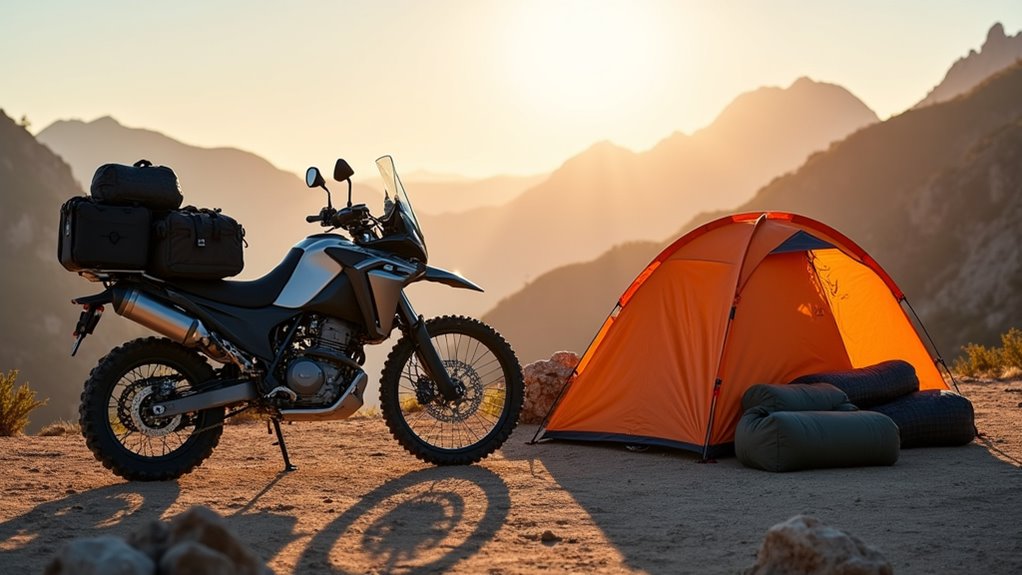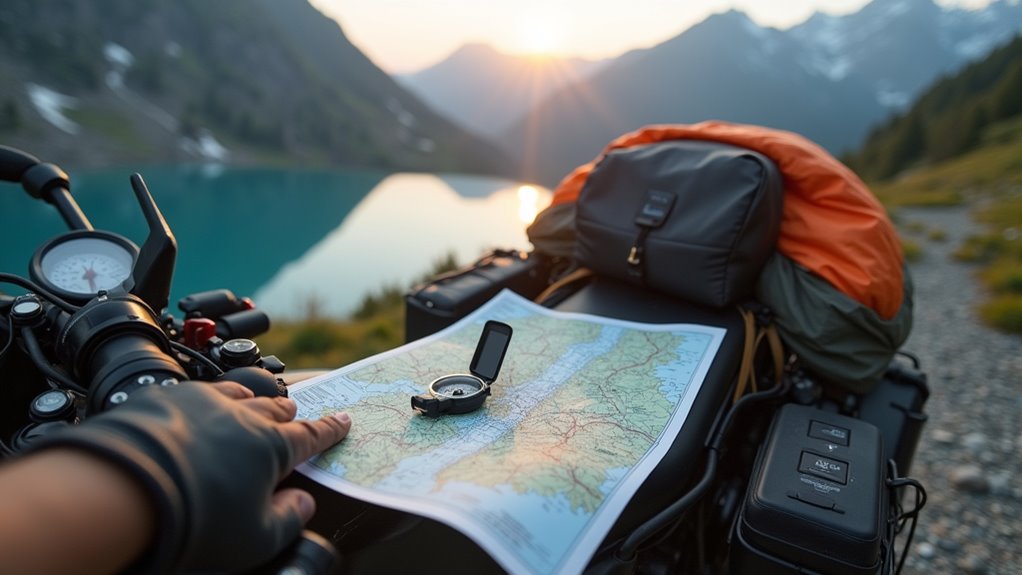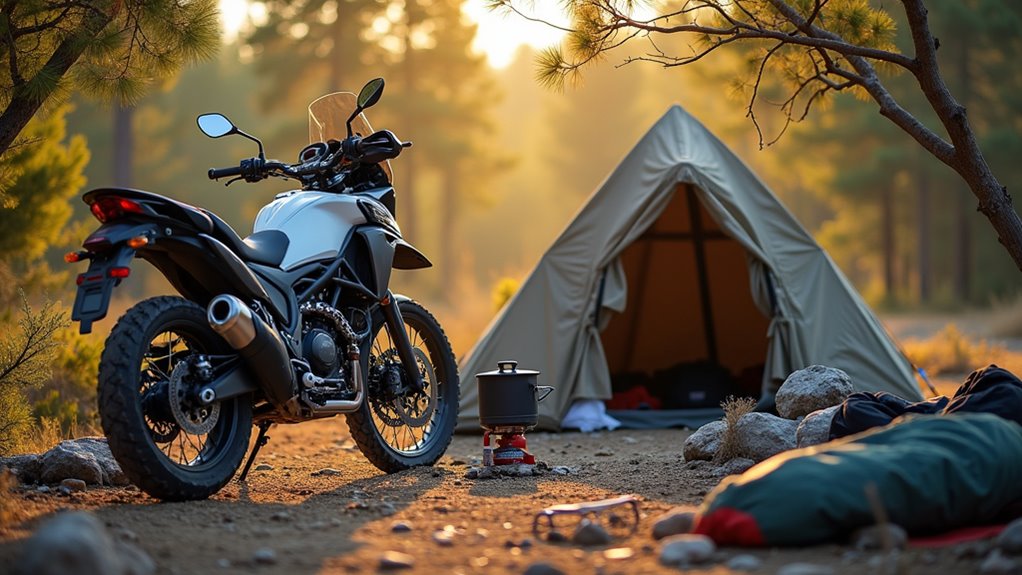Physical Address
304 North Cardinal St.
Dorchester Center, MA 02124
Physical Address
304 North Cardinal St.
Dorchester Center, MA 02124

Six critical factors separate successful motorcycle camping adventures from complete disasters—discover what experienced riders wish they'd known before their first trip.
You’ve probably dreamed of hitting the open road with your camping gear strapped to your bike, but motorcycle camping isn’t as simple as throwing a tent in your car’s trunk. There’s a delicate balance between bringing what you need and staying within your bike’s weight limits, plus you’ll face challenges that car campers never encounter. Before you book that first campsite, there are six critical areas that’ll make or break your adventure.

When you’re loading gear onto a motorcycle, every ounce matters and every cubic inch counts. You’ll need to prioritize lightweight, multi-purpose items that pack small but deliver big functionality.
Start with a compact sleeping bag rated for expected temperatures and a lightweight tent or bivy sack. Choose quick-dry clothing you can layer and wash easily. Pack a small camp stove, collapsible cookware, and minimal utensils—skip anything you won’t absolutely need.
Use compression sacks and packing cubes to maximize space efficiency. Distribute weight evenly between saddlebags, keeping heavy items low and close to the bike’s center. Your rain gear should stay accessible, not buried deep.
Consider investing in a lightweight camping table that can fold down to minimal dimensions while providing a stable surface for meal preparation and gear organization at your campsite.
Since your motorcycle’s handling and safety depend entirely on how you load your gear, mastering weight distribution becomes your most critical skill. Keep heavy items low and close to the bike’s center of gravity.
Pack your sleeping bag and clothes in saddlebags, placing tools and cooking gear near the bottom.
You’ll want 60% of weight toward the front, 40% at the rear. Don’t exceed your bike’s weight limits – check your manual.
Secure everything with bungee nets, not cords that can snap.
Budget-friendly storage solutions include military surplus bags and DIY tie-down points.
Test your loaded bike in a parking lot before hitting the road. Poor weight distribution causes dangerous wobbles, especially during emergency maneuvers or crosswinds.
Consider exploring affordable camping gear options that are specifically designed for motorcycle touring to maximize your storage efficiency without breaking your budget.

Your properly loaded motorcycle opens up endless possibilities, but smart route planning separates memorable adventures from costly mistakes. You’ll need reliable maps, GPS backup, and campground research before hitting the road.
Start by identifying fuel stops every 100-150 miles—running out of gas with camping gear isn’t fun. Research elevation changes that’ll affect your bike’s performance and fuel consumption. Check weather patterns along your route and have backup plans for unexpected storms.
Essential planning steps:
Smart planning keeps costs down and stress levels manageable. Consider whether renting or buying camping equipment makes more financial sense for your trip frequency and storage situation.
While your carefully planned route sets the foundation for adventure, Mother Nature doesn’t always cooperate with your itinerary. You’ll need reliable weather apps and backup plans when storms threaten your campsite.
Pack a quality rain suit that doubles as wind protection – it’s cheaper than replacing soaked gear. Your tent should handle more wind than forecast conditions suggest, since motorcycle camping often means exposed locations.
Consider lightweight tarps for extra shelter and gear protection. They’re versatile and won’t break your budget.
Layer your clothing system rather than packing bulky items. Merino wool base layers regulate temperature efficiently and dry quickly.
Always check local weather patterns before departure, and don’t hesitate to adjust your timeline. A weather forecast watch can help you monitor changing conditions continuously throughout your journey. Flexibility beats stubbornness when facing severe weather conditions.

Although you’ve escaped civilization’s hustle, thieves don’t take camping vacations. Your motorcycle and gear remain tempting targets, especially at popular camping spots. Smart security doesn’t require expensive gadgets—just common sense and basic precautions.
Never leave valuables visible on your bike. Store electronics, wallets, and jewelry inside your tent or locked storage compartments.
Out of sight, out of mind—keep your valuables hidden from opportunistic thieves who scout campsites for easy targets.
Park your motorcycle where you can see it from your campsite, preferably near other campers who’ll notice suspicious activity.
Essential security measures include:
Trust your instincts—if something feels off, relocate immediately. When selecting your sleeping gear, consider investing in a waterproof sleeping bag that protects your rest even if weather conditions deteriorate overnight.
Beyond protecting your gear from theft, motorcycle camping presents unique risks that demand proper preparation and quick thinking. You’ll need a thorough first aid kit that fits your bike’s storage constraints. Pack essentials like bandages, antiseptic, pain relievers, and any personal medications.
Create an emergency contact list and share your travel itinerary with someone reliable. Download offline maps since cell service isn’t guaranteed in remote areas. Carry a whistle, flashlight, and basic tools for roadside repairs.
Know your bike’s limits and don’t push beyond your skill level on unfamiliar terrain. Check weather conditions frequently and have backup camping locations identified. If something feels wrong, trust your instincts and change plans. Your safety’s worth more than any campsite.
Consider planning some family camping activities that work well for motorcycle camping to keep everyone engaged and entertained at your campsite.
You’ve now got the roadmap for your motorcycle camping adventure, and here’s the coincidence – most seasoned riders wish they’d known these exact tips before their first trip. You’ll save money by avoiding common mistakes like overpacking or choosing expensive campsites without research. Don’t skip the prep work; your future self will thank you when you’re comfortably set up while others struggle with poor planning. Your adventure starts with smart preparation.